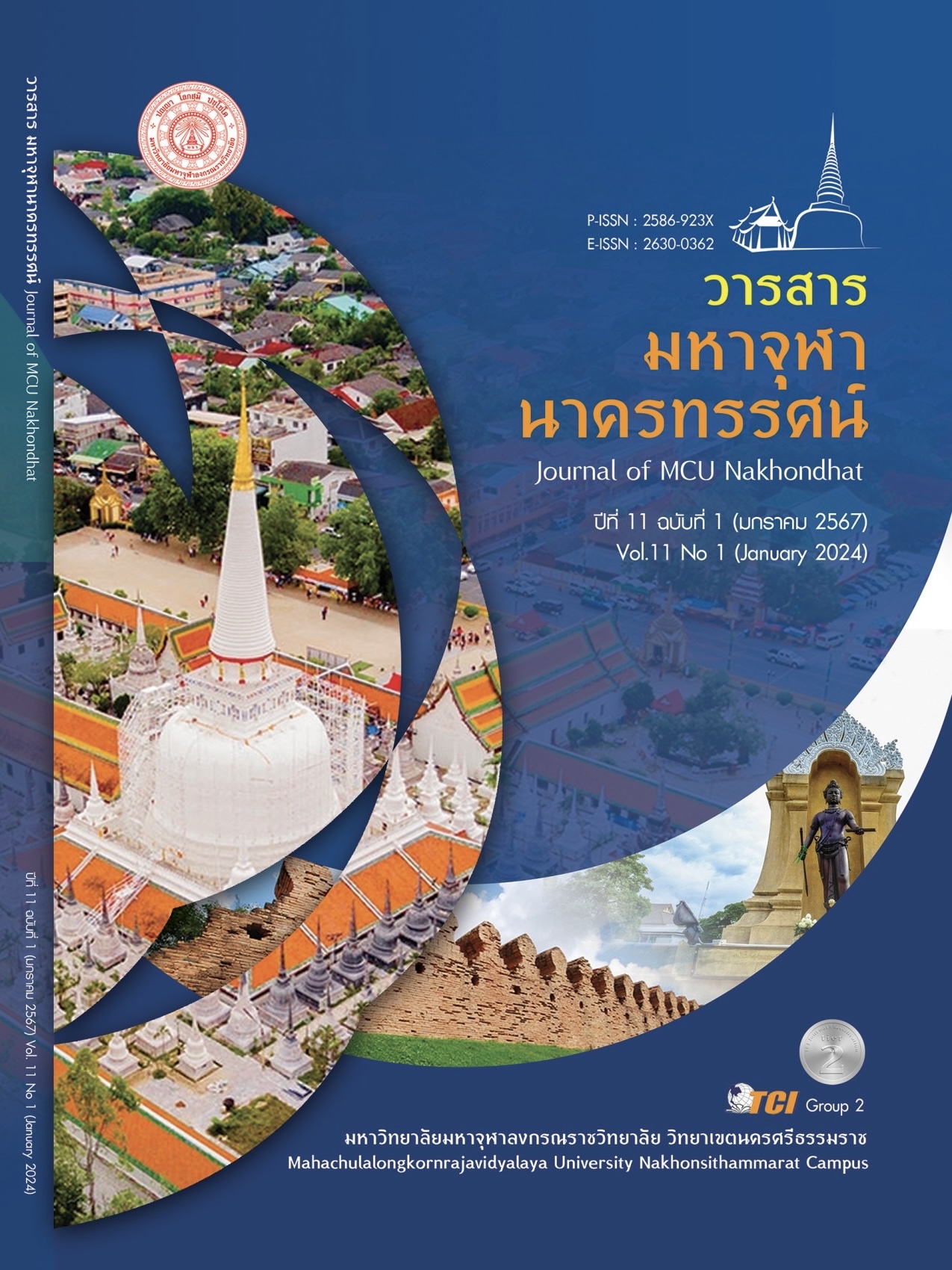BUDDHIST EMOTIONAL INTELLIGENCE : INTEGRATING DHARMA PRINCIPLES INTO A HAPPY WORKPLACE IN BANI WORLD ERA
Main Article Content
Abstract
This article aims to present the Buddhist way of emotional intelligence by analyzing the integration of Dharma principles into a happy organization in the changing era. Because it is a skill that human resources in a changing world need. Happiness is an important emotional intelligence at work, it is considered a very important factor for the management of the organization, which directly affects both the individual level in order to create motivation to work more efficiently and affects the organization to make the organization a place of happiness. Creating a culture of happiness in an organization will take time to change attitudes that have been accumulated for a long time. It requires patience, commitment to problem solving and effort to create happiness in the organization. Buddhism is believed to be a religion of education and development of individual potential. Achieving Buddhist goals aims to develop a comfortable mind in the midst of various situations. The approach to integrating emotional intelligence according to the Buddhist approach includes: 1) The development of emotional intelligence according to the principles of mindfulness are Kãyãnupassanã, Vedanãnupassanã, Cittãnupassanã and Dhammãnupassanã, and 2) The development of emotional intelligence according to the Yonisomanasikãra principle, consisting of discriminating between components, blame and exit thinking, investigative thinking, and interrelated thinking with goal principles. Problem - solving thinking, simple cognitive thinking. Think of genuine values, artificial values. Think morally, think in the present moment, and think in isolation.
Article Details

This work is licensed under a Creative Commons Attribution-NonCommercial-NoDerivatives 4.0 International License.
References
กรมสุขภาพจิต กระทรวงสาธารณสุข. (2545). คู่มือความฉลาดทางอารมณ์. กรุงเทพมหานคร: ศูนย์สารนิเทศและประชาสัมพันธ์ กรมสุขภาพจิต.
ชาญวิทย์ วสันต์ธนารัตน์. (2551). องค์กรแห่งความสุข ด้วยความสุข 8 ประการ. เรียกใช้เมื่อ 15 พฤศจิกายน 2562 จาก https://www.doctor.or.th/article/detail/5572
เทิดศักดิ์ เดชคง. (2555). เทคนิคให้คำปรึกษาแบบสร้างแรงใจ : หลักการเปลี่ยนแปลงพฤติกรรมสุขภาพด้วยการสนทนาสร้างแรงจูงใจ. กรุงเทพมหานคร: หมอชาวบ้าน.
ธงชัย สมบูรณ์. (2560). โลกหลังยุคใหม่ อนาคตทางการศึกษาและปัญญาของชาติ. เรียกใช้เมื่อ 31 ธันวาคม 2560 จาก https://www.matichon.co.th/columnists/news_783896
แผนงานสุขภาวะองค์กรภาคเอกชน. (2552). คู่มือมาสร้างองค์กรแห่งความสุขกันเถอะ. กรุงเทพมหานคร: แผนงานสุขภาวะองค์กรภาคเอกชน สำนักงานกองทุนสนับสนุนการสร้างเสริมสุขภาพ (สสส.).
พระธรรมปิฎก (ป. อ.ปยุตฺโต). (2541). แง่คิดข้อสังเกต เกี่ยวกับการปฏิรูปการศึกษา. กรุงเทพมหานคร: คุรุสภาลาดพร้าว.
พระธรรมปิฎก (ป. อ.ปยุตฺโต). (2546). พจนานุกรมพุทธศาสตร์ ฉบับประมวลธรรม. (พิมพ์ครั้งที่ 12). กรุงเทพมหานคร: โรงพิมพ์มหาจุฬาลงกรณมหาวิทยาลัย.
พระธรรมปิฎก (ป. อ.ปยุตฺโต). (2548). สู่การศึกษาแนวพุทธ. (พิมพ์ครั้งที่ 6). กรุงเทพมหานคร: มูลนิธิพุทธธรรม.
พระธรรมปิฎก (ป. อ.ปยุตฺโต). (2559). ลักษณะแห่งพระพุทธศาสนา. กรุงเทพมหานคร: โรงพิมพ์เจริญดีมั่นคงการพิมพ์.
พระไพศาล วิสาโล. (2555). ความสุขอันประเสริฐ. กรุงเทพมหานคร: บริษัทสำนักพิมพ์สุภา จำกัด.
ภูมิวรพล กุณทา. (2563). ความฉลาดทางอารมณ์ที่ส่งผลต่อคุณภาพชีวิตของนักเรียนเดินเรือพาณิชย์ ศูนย์ฝึกพาณิชย์นาวี. ใน วิทยานิพนธ์ปริญญามหาบัณฑิต สาขาวิชาการบริหารการศึกษา . มหาวิทยาลัยศิลปากร.
วรากรณ์ สามโกเศศ. (2565). กรอบคิด VUCA สู่ BANNI. เรียกใช้เมื่อ 15 พฤศจิกายน 2566 จาก https:// www.bangkokbiznews.com/columnist/1004689
วิทย์ วิศวเวทย์ และเสฐียรพงษ์ วรรณปก. (2559). พระพุทธศาสนา ชั้นมัธยมศึกษาปีที่ 5. กรุงเทพมหานคร: บริษัท อักษรเจริญทัศน์ จำกัด.
สมเด็จพระพุทธโฆษาจารย์ (ป. อ. ปยุตฺโต). (2559). พุทธธรรมฉบับเดิม. (พิมพ์ครั้งที่ 31). กรุงเทพมหานคร: โรงพิมพ์พระพุทธศาสนาของธรรมสภา.
สำนักงานเลขาธิการสภาการศึกษา. (2564). ข้อเสนอระบบการเรียนรู้เพื่อตอบสนองการเปลี่ยนแปลงของโลกอนาคตในปี 2040. กรุงเทพมหานคร : สำนักงานเลขาธิการสภาการศึกษา.
อำนาจ ศรีรัตนบัลล์. (2560). การสร้างเสริมสุขภาพและการเสริมพลังชุมชน. กรุงเทพหมานคร: สำนักงานกองทุนการสร้างเสริมสุขภาพ สำนักสร้างสรรค์โอกาสและนวัตกรรม (สำนัก 6).
Bar-On, R. . (1997). The Emotional Quotient Inventory (EQ-I) : Technical Manual. Toronto, Canada : Multi- Health Systems.
Burton, J. (2010). WHO Healthy Workplace Frameworkand Model : Background and Supporting Literature and Practice : Word Health Organization. Retrieved December 22, 2023, from www.who.int /occupational_health/healthy_workplace_framework.pdf
Cooper, R. K., & Sawaf, A. (1997). Executive EQ: Emotional Intelligence in Business. London: Orion Business Books.
Goleman, D. (1995). Emotional Intelligence. New York: Bantam Books.
Goleman, D. (1998). Working with Emotional Intelligence. New York: Bantam Books.


